NOVEMBER 12-14, 2022 : Jews first arrived in Corfu from Venice in the 15th century. The Jewish population increased significantly following the Spanish and Portuguese expulsions around the beginning of the 16th century. These immigrants formed the new Sephardic community and had their own synagogue, schools and cemetery. Over the years, the situation of the Jews sometimes improved and at other times deteriorated as control of Corfu passed from the Venetians to the French, to the English and finally to the emerging Greek state.
At the beginning of World War II, there were about 2000 Jews living in Corfu. At the time, there were four synagogues. Like in other places we visited in Northern Greece, the Jews were left alone when the Italians occupied the island in 1941. Only when the Germans arrived in 1943, did their situation take a turn for the worse. On June 9, 1944 , only four months before liberation, the Jews were rounded up, imprisoned in the Old Fortress, and then taken to Auschwitz. Only 180 returned. Three of the four synagogues were destroyed. Only the La Scuola Greca synagogue, used by the Romaniote community, survived.
Today about 60 Jews still live on the island.
La Scuola Greca Synagogue
We arrived in Corfu on a Friday afternoon. Our apartment was on the same street as the La Scuola Greca synagogue, just a few doors down. Once we settled into the apartment, Mark went to the synagogue to ask about Shabbat services. The doors were closed and when he knocked, a security guard answered. He told Mark that there are no services, the synagogue is closed on Saturday. Mark asked to see the inside of the synagogue, and he kindly let him in.
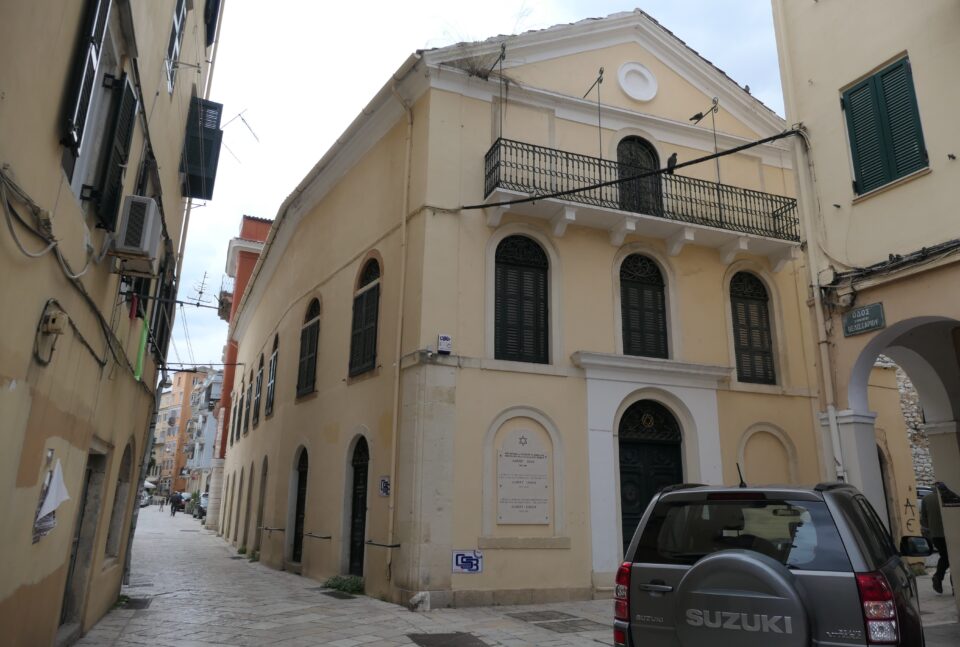
I also wanted to see the synagogue and according to Google, the synagogue should open on Monday at 10:00 in the morning for visitors. Over the weekend, we passed the synagogue several times and it was always closed. On Monday, we went to the synagogue a little after 10:00, and found the doors still closed. We knocked, and this time a different security guard answered. He was very gruff and told us the synagogue is closed for the winter, and we cannot go in, there is a security system. This was a security guard that you did not argue with. He closed the doors, and I gave up on seeing the inside.
We stood in front of the synagogue a couple of minutes longer, while Mark verified the GPS coordinates for Wandering Jew. As we were standing there, a woman about our age approached and knocked on the synagogue door. The guard answered and they spoke in Greek. She turned to us, and asked in English, if we would like to see the synagogue. We said we came from Israel and yes, we would love to go inside. She argued with the guard, and basically from her gestures I understood that she was taking responsibility for us.
She led us in and explained that she is the daughter of one of the few Jews from Corfu that survived Auschwitz and she had come to the synagogue to give a lecture about the Jews of Corfu and the Holocaust to a group of Greek high school students. When Mark asked her name, she said My name is Nina Vital. My father’s name is Samuel, and his number from Auschwitz was A15658. That is how she introduces herself. We were very grateful to have met her.
The synagogue, dating back to the seventeenth century, was in the Venetian style, with the prayer hall up one flight of stairs. Like in the Romaniote synagogue in Ioannina, on the eastern wall was the ark, on the western wall, the bimah, and the chairs all faced a center aisle.
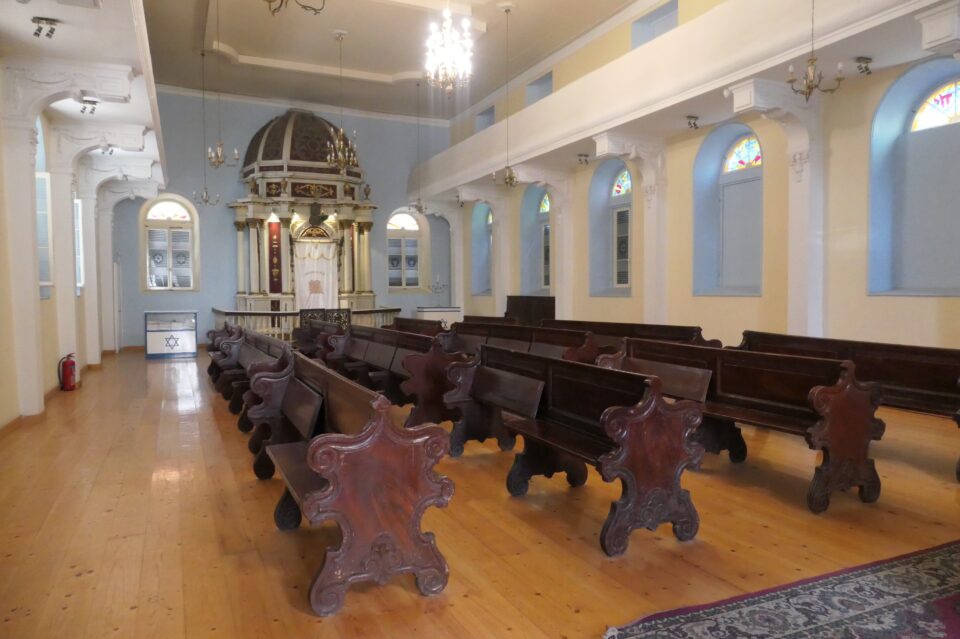
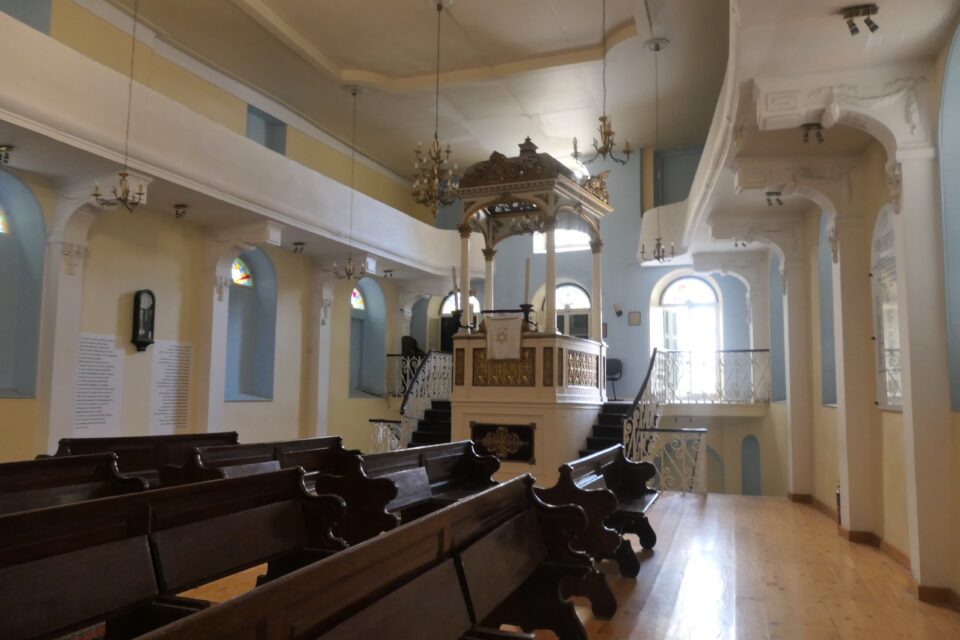
A memorial plaque with the family names of those who perished in the Holocaust hangs on the wall.
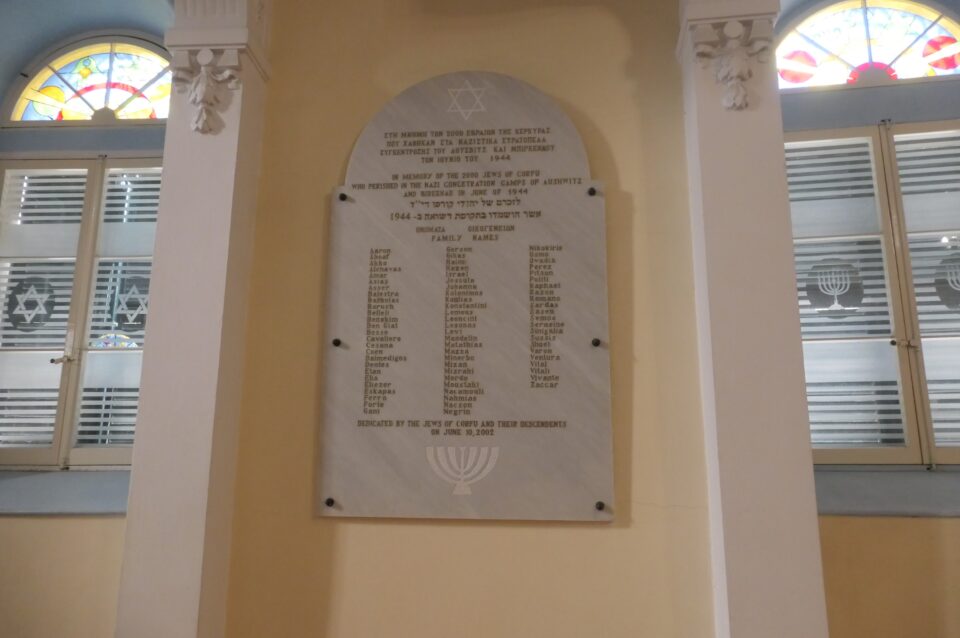
As we left the synagogue, a large group of high school students was approaching. These were the kids that Nina was waiting for.
The Jewish Quarter
Corfu Old Town has seven different districts. One of the seven is still known as the Evraiki (Jewish) neighborhood. The Jewish Community of Corfu was unique among those in Greece as being the only one whose members lived in a specific area, with clearly defined boundaries separating it from the rest of the city; the “ghetto”, as its own residents called it. The existence of a ghetto is a direct result of the island’s history: for centuries it had been under occupation by western forces (Venetians, French and English) in contrast to the rest of Greece, which was part of the Byzantine Empire before it came under Ottoman rule. Under these western forces, the Jews were often the subjects of blood libels, and the ghetto was a form of protection.
Our apartment (and the synagogue) were located on Velissariou street, delineating the western border of the ghetto. Evraiki today is an area of narrow winding lanes, with most buildings three or four stories tall. Shops occupy the ground floor. Three of the streets in the area were renamed to reflect the Jewish heritage of the place.
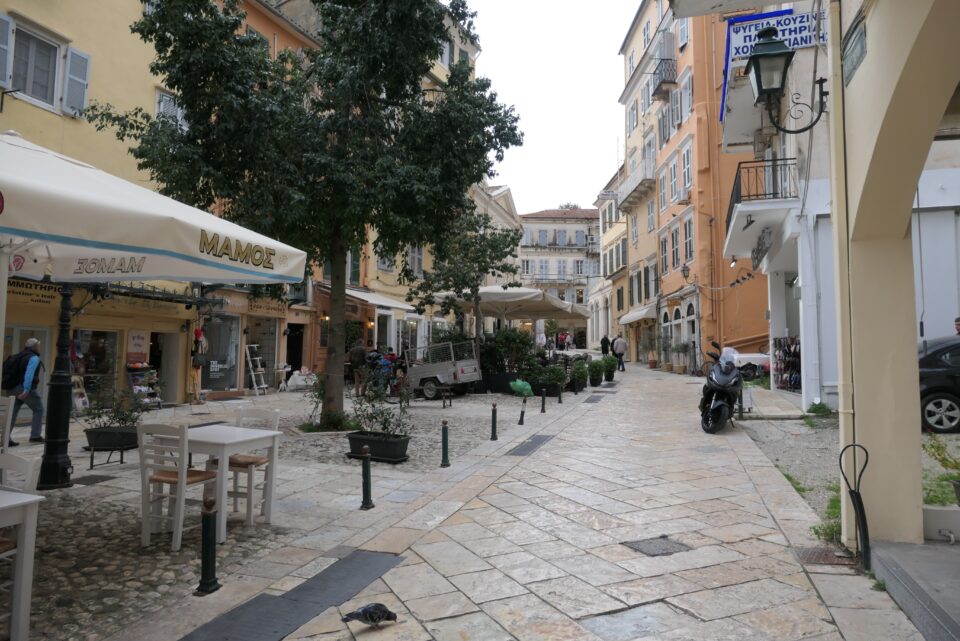
Albert Cohen
Outside the synagogue in Corfu is a plaque that reads in Greek, French and English “A child was born in this neighborhood and here he took his first steps. The child was Albert Cohen. 1895 – 1981“
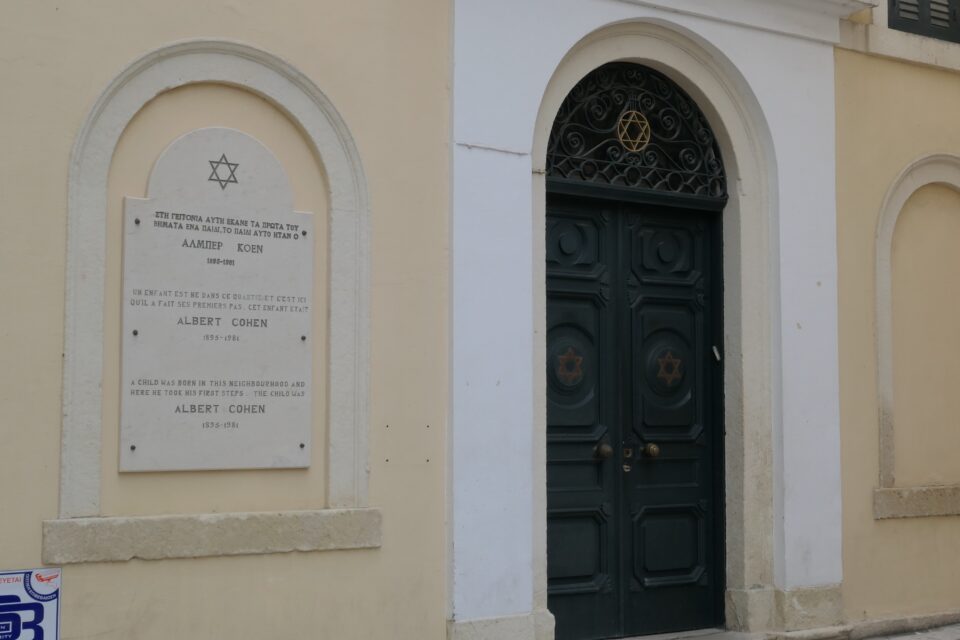
Albert Cohen was a Romaniote Jew born in the Evraiki in 1895, moved to France with his parents when he was a young child, and then at 19 went to Switzerland to study and became a citizen in 1919. He died in Geneva in 1981. He was a Swiss novelist who wrote in French. Four of his books are considered autobiographical fiction, where the main character has a constant struggle between his Jewish roots and his social status. His work has been translated into many languages and has received international acclaim.
In addition to the synagogue plaque, one of the streets in the Jewish quarter, is named for him – Alvertou Koen street. There is also an Alvertou Koen Place behind the synagogue.
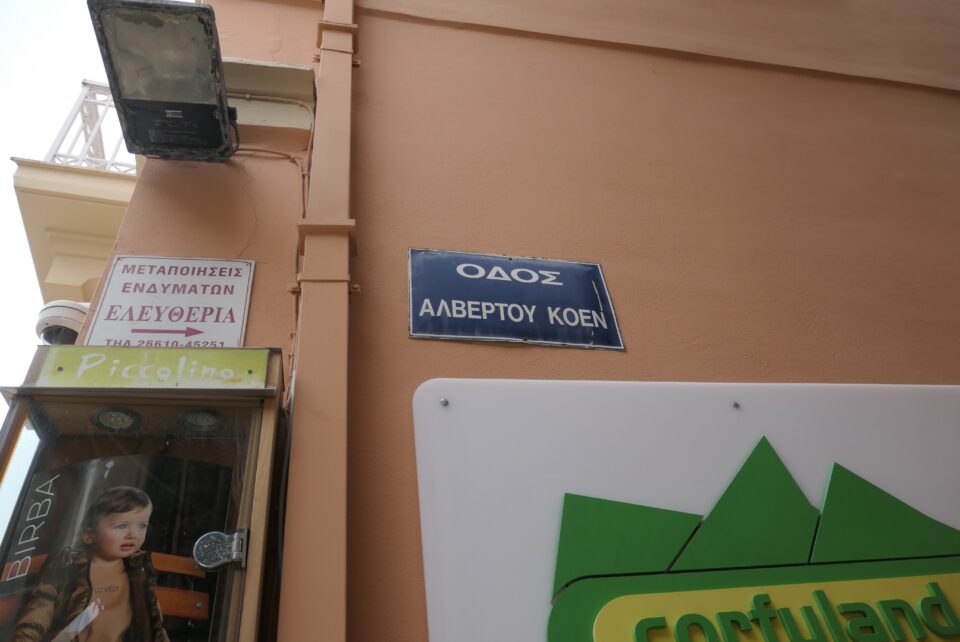
In addition, there is an association “Albert Cohen Corfu” which is a culturally oriented association founded in 2011 in Corfu, promoting the principles of the Corfu-born humanist, diplomat and author Albert Cohen. They hold events that highlight facts and personalities that are related to Corfu’s history, and, at the same time, have played a significant role in the international scene.
Additional Jewish Street Names
The next street, parallel to Alvertou Koen, is Lazarou Mordou, named for a prominent Jewish doctor (Lazar Shabbetai de Mordo).
One street over is Evraion Thymaton Nazismou – Jewish victims of Nazism street.
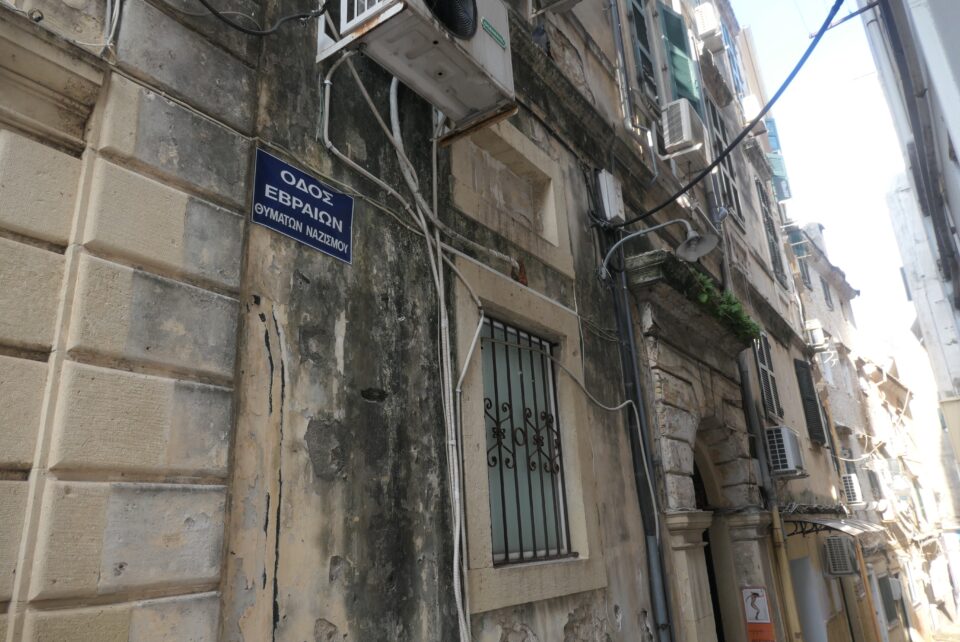
The Holocaust Memorial
In addition to a street name to commemorate the Holocaust, there is also a Holocaust Memorial statue near the base of the New Fortress. It consists of a woman cradling an infant and a man seemingly helpless to protect a boy who hides his face in the man’s thigh, all in the nude. The sculpture was erected in 2001 by the city and the Jewish community. A plaque on the memorial states “Never again for any nation.”
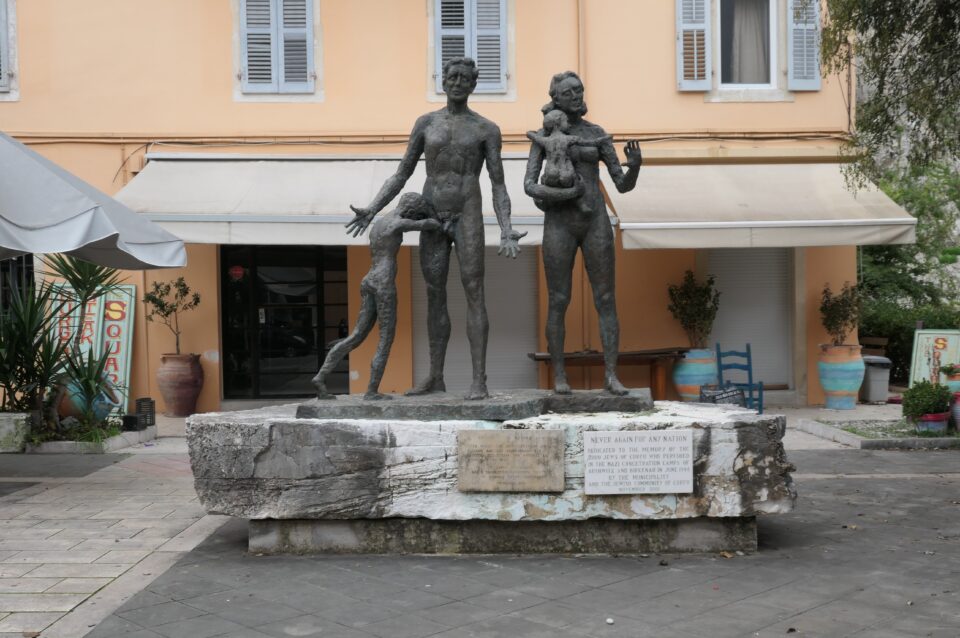
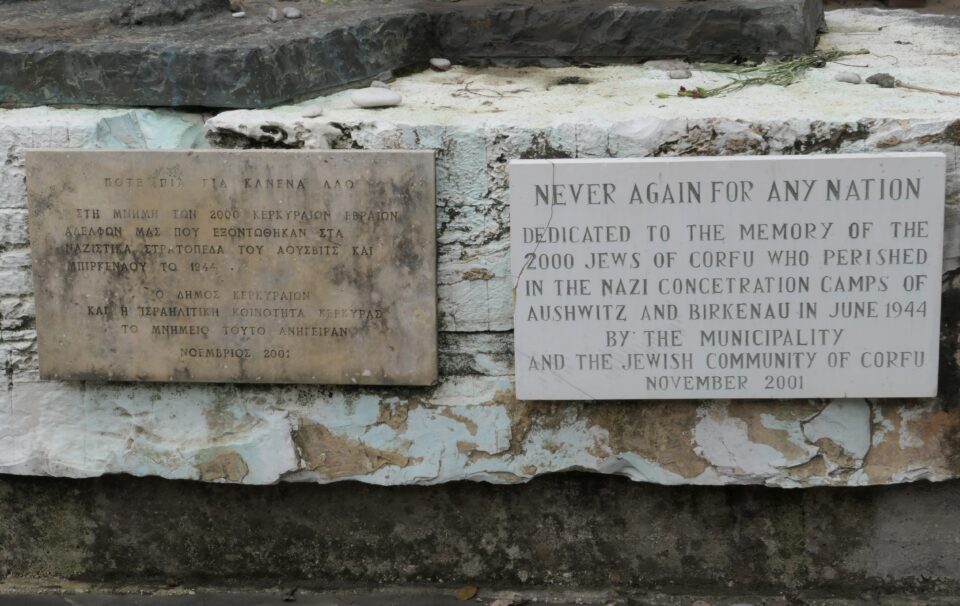
The Jewish Cemetery
In the past, there were two Jewish cemeteries in Corfu – the old Romaniote Jewish Cemetery and the old Sephardic Jewish Cemetery. The two communities were so separate, that they even did not share a cemetery. Both these cemeteries, no longer exist, and in their place stands a school and a fire station.
Today there is only the New Jewish Cemetery of Corfu. We drove to see it, and as usual, it was locked. Through the wrought iron gate, we could see the tombstones in the far corner.
The Jewish cemetery lies adjacent to the Christian cemetery, which was open. We thought if we could walk in the Christian cemetery, along their shared wall, we might get to a better viewpoint. Walking in the Christian cemetery itself was interesting – very colorful, full of fresh flowers. Many tombstones have pictures of the deceased and his family.
We eventually found a spot where we could get a closer look at the Jewish tombstones over the wall.
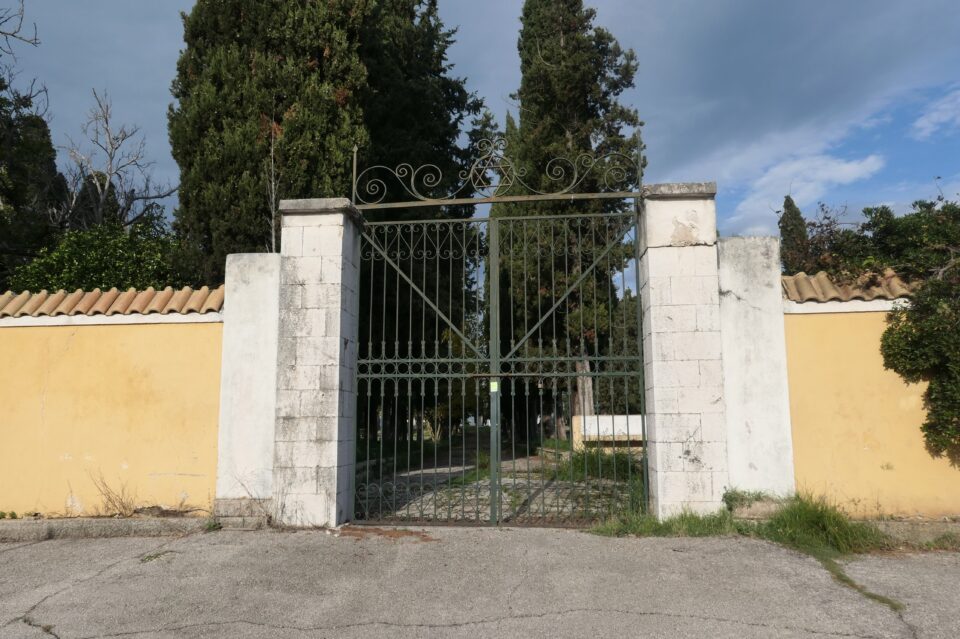
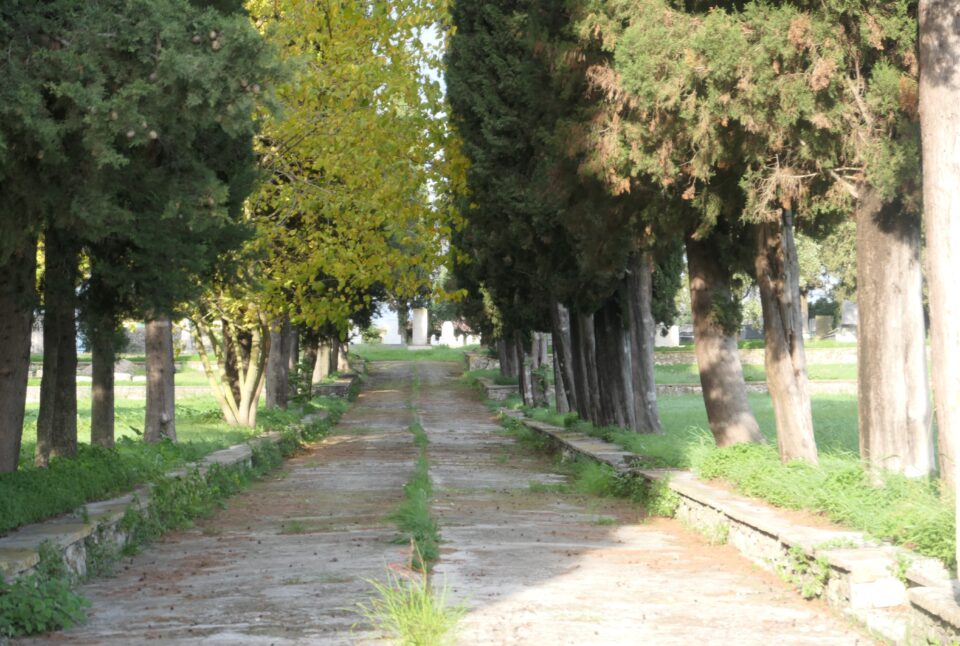
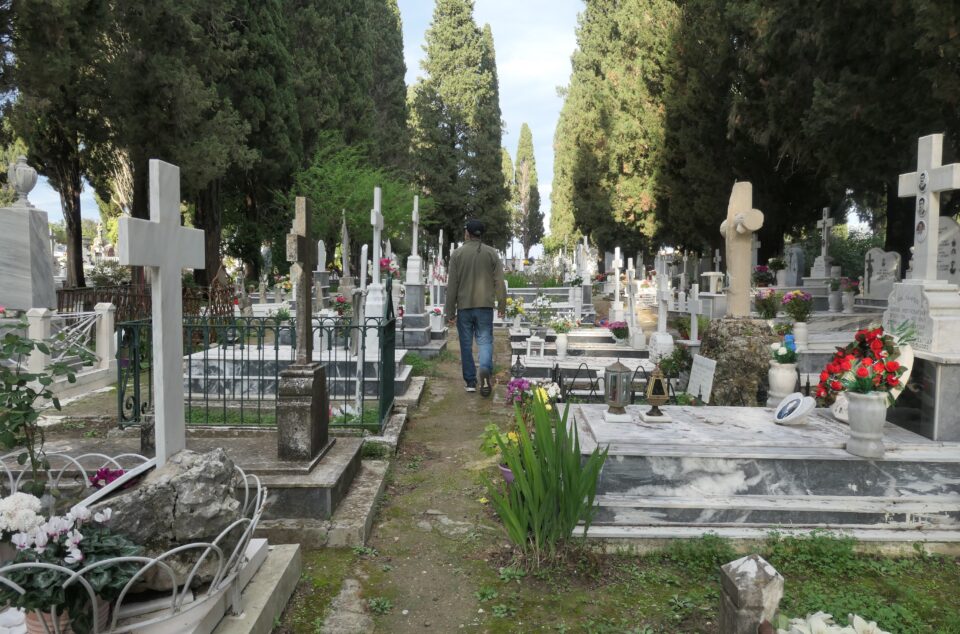
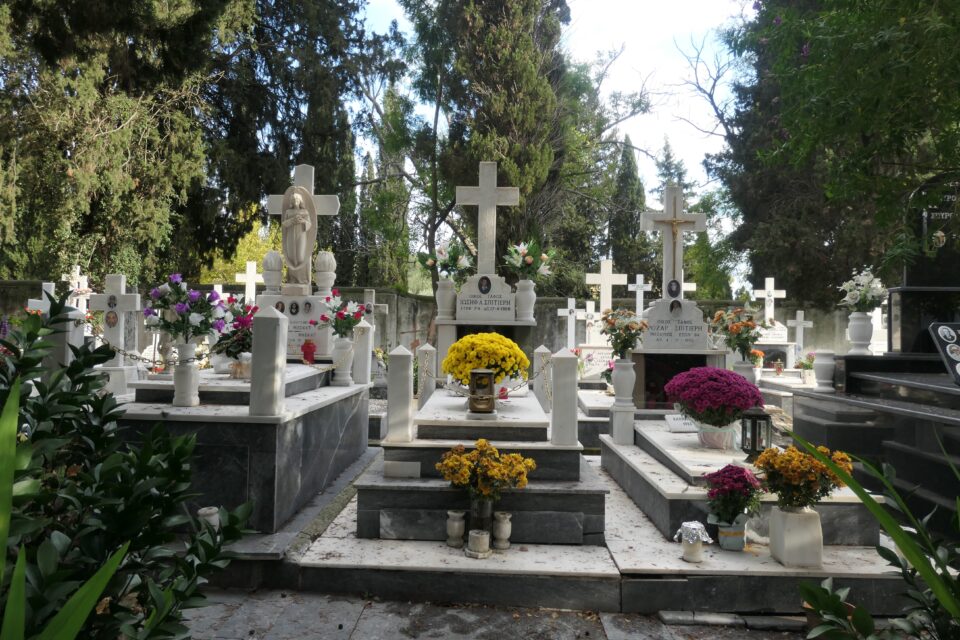
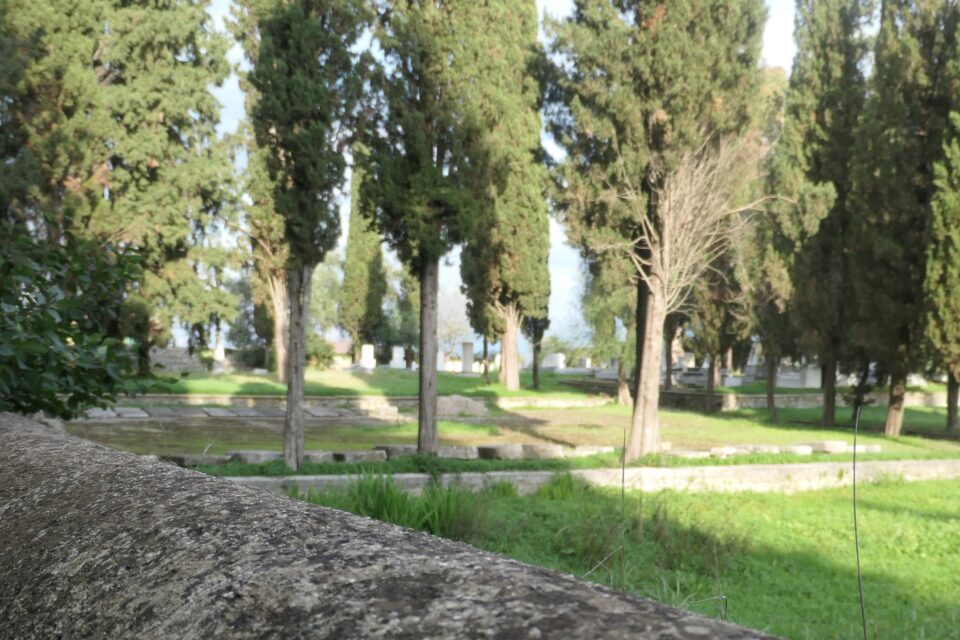
Additional Jewish sites
There are a few remains of Jewish buildings that can be found in the Evraiki. There is a wall that belonged to a former synagogue.
In addition, Nina showed us the ruins of the previous Talmud Torah and the Jewish Old Age home.
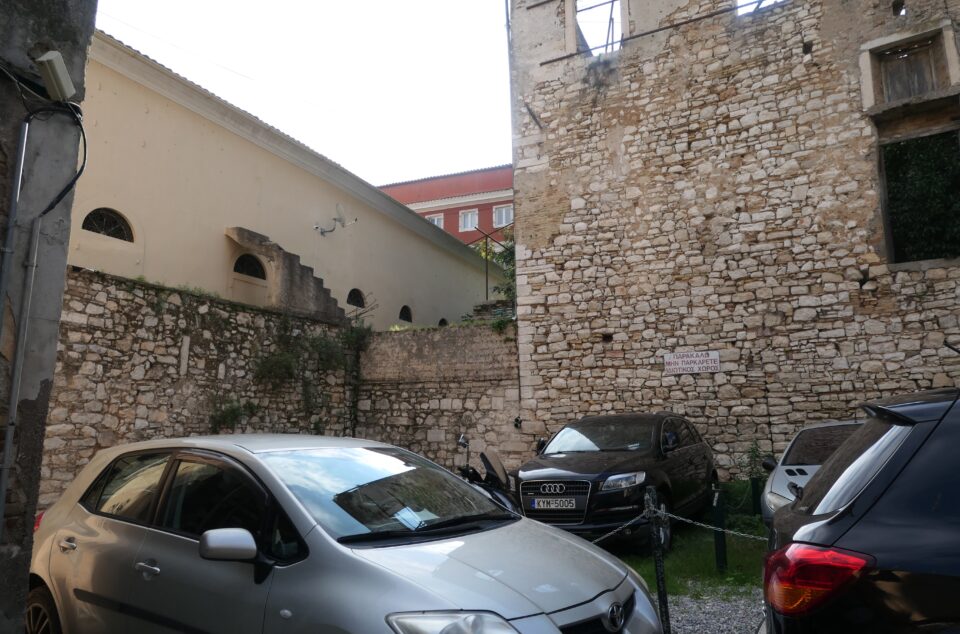
In January of this year, a documentary was released about the Jews of Corfu, called Oi Evraioi tis Kerkyras (The Jews of Corfu). The movie was shown at the Thessaloniki International Documentary Festival. Nina Vital is featured in the film. A trailer is available on YouTube.
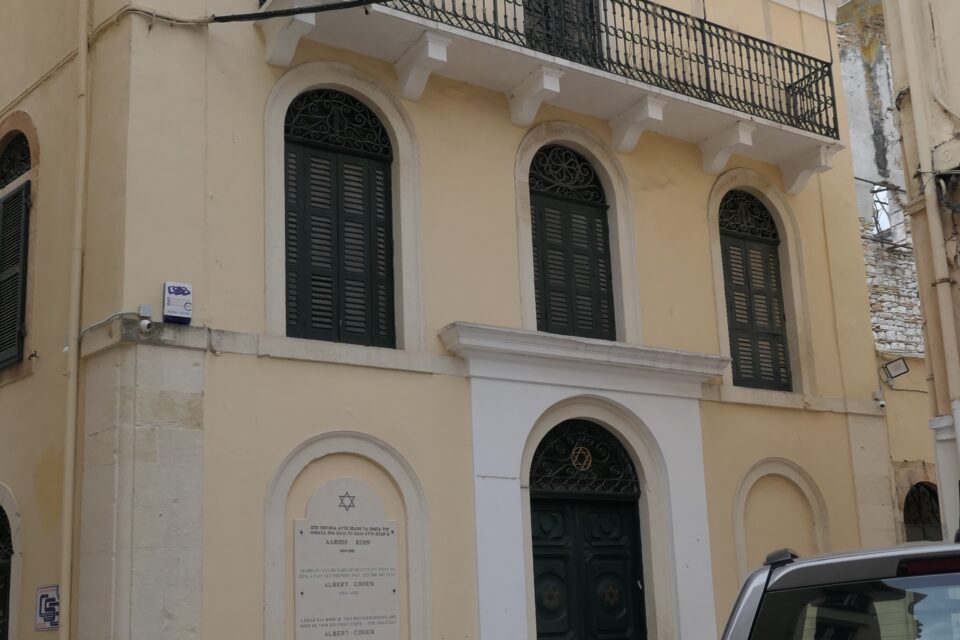
so interesting. waiting to read about Athens too.
I have been reading all of your postings. You are the most amazing detectives for things Jewish-and just diligence and thoroughness. Amazing work!! And you have just great stories; amazing blow by blow; I really feel I am with you, on the ladders, peering into the “New Cemetery” and ‘Old Cemetery” of each town